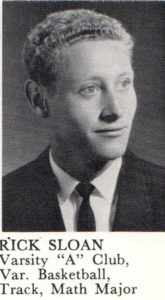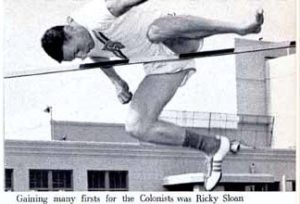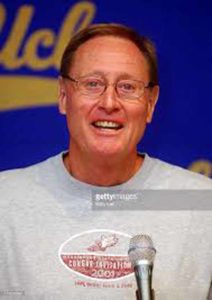 As a skinny sixth grader in 1957, his photo appeared in the Anaheim Bulletin’s sports section competing in a long forgotten jumping competition. The caption suggested that “maybe someday little Ricky Sloan” will make it to the Olympics.”
As a skinny sixth grader in 1957, his photo appeared in the Anaheim Bulletin’s sports section competing in a long forgotten jumping competition. The caption suggested that “maybe someday little Ricky Sloan” will make it to the Olympics.”
The prediction came true but in such a roundabout way that some might call it miraculous.
Miracle or not, Sloan’s hard work and perseverance certainly played a role in his athletic career that led him to the 1968 Olympics and a coaching position for more than 40 years with Washington State University.
Apparently, there was something about running, leaping and jumping over poles that attracted this Anaheim youngster’s attention enough that he kept at it until he began setting records. Ultimately, he placed 7th in the 1968 Olympics decathlon, setting a world record decathlon high jump record in try outs of 6-11 ¾. He also became the fourth American in the sport to exceed 8,000 points.
Upon reading the Anaheim Bulletin article, Sloan had to ask his parents what the Olympics were. Once it was explained to him, Sloan said in another newspaper article about himself, this one in 1995, that he thought, “yeah, that’s something I would like.”
What followed was his mechanic father welding uprights and Sloan using old mattresses and sticks of bamboo as his first pole vault apparatus.
 Despite having Osgood-Schlatter disease in both legs as a teen, Sloan would straddle-style into saw dust pits to high jump 6-foot-7-inches at Anaheim High to win the CIF title. (The California record at the time was 6-9.)
Despite having Osgood-Schlatter disease in both legs as a teen, Sloan would straddle-style into saw dust pits to high jump 6-foot-7-inches at Anaheim High to win the CIF title. (The California record at the time was 6-9.)
Universities with the reputations as major track powers wanted him, but his grades held him back. Instead, he worked and enrolled at Fullerton College, eventually improving his mark to 6-10 in the high jump.
He made it to UCLA, where he became the first Bruin to exceed 7-feet in the high jump; he vaulted 7-1 when the world record was 7-7.
Near the start of his senior season in 1968, Sloan broke a bone in his ankle and required surgery. He could not recover soon enough to make the Olympics team in the high jump or vault, and was talked into training for the decathlon.
To quote a May 16, 1995 article about him in the Spokesman-Review by Dave Boling: “At age 21, truly a baby in the decathlon, he went on to win 7th place in Mexico City. After the two-day ordeal had completed, Sloan walked through the empty stadium with his poles. On the P.A. system, someone had piped in Beethoven’s “Ode to Joy.” Sloan said he looked up at the Olympic flame against the blacken sky and cried from the realization of his amazing accomplishment.”
Sloan continued competing after the Olympics and was runner-up in the 1969 AAU Amateur Athletic Union (AAU) decathlon. He also competed with the Southern Cal Striders track and field club, which in its day, laid claim to being “largest and strongest multiracial track-and-field club in the history of the sport, with a collection “America’s finest Olympic Track and Field Stars.”
Unfortunately for Sloan, he couldn’t sustain his athlete career and support a family. With a new baby on the way with his wife, Sandy, Sloan gave up competing at age 22 and sold paint in a hardware store for two years while earning his teaching degree.
He told the reporter that he wished the system had allowed him to continue his athletic career. “I honestly believe I could have won gold in Munich in ’72, or at least bring home a medal.”
 By 1973, Sloan was coaching track and field part time for Washington State. He spent 41 years at the university, retiring in 2014 at age 67. During his four-decades-long coaching career at WSU, about half spent as an assistant, then transitioning to head coach in 1994. He finished as the men’s and women’s track and field head coach and the dean of Cougar coaches.
By 1973, Sloan was coaching track and field part time for Washington State. He spent 41 years at the university, retiring in 2014 at age 67. During his four-decades-long coaching career at WSU, about half spent as an assistant, then transitioning to head coach in 1994. He finished as the men’s and women’s track and field head coach and the dean of Cougar coaches.
During his tenure as the Cougar track program’s mentor, Sloan has seen the men set 22 school records and the women set 84 school records. He has directed 42 WSU athletes to NCAA outdoor all-American status 76 times and directed 33 athletes to NCAA indoor all-American status 47 times.
Sloan is well known internationally in the multi-events circuits because of his 14 years as coach for four-time world decathlon champion, Olympic champion and former world record-holder Dan O’Brien and because of his mentoring of Olympic heptathlete Diana Pickler. He’s also coached the late Gabriel Tiacoh, the quarter-miler from Ivory Coast who won an Olympic silver medal in 1984.
For more statistics on his appearance in the 1968 Olympics, visit:
http://www.sports-reference.com/olympics/athletes/sl/rick-sloan-1.html




